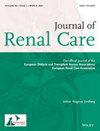Many people with kidney failure start and remain on in-centre haemodialysis treatment despite evidence of improved outcomes with home dialysis. To make an informed modality decision patients must receive frequent, high-quality modality education. This education is inconsistent in the in-centre haemodialysis setting, where patients spend the most time with nurses while receiving haemodialysis treatments.
The aim of this study was to examine in-centre haemodialysis nurses' perceptions around modality education for patients receiving in-centre haemodialysis using the COM-B model of behaviour change.
We used framework analysis as a research method, applying the COM-B model as a theoretical framework to understand nurses' perceptions of modality education.
We interviewed 13 in-centre haemodialysis nurses in a single province in Canada.
We completed semi-structured interviews via Zoom, which ranged from 30 to 60 min.
Participants reported knowledge deficits, lack of experience or exposure to other dialysis modalities, and lack of resources to support modality education practices. In-centre haemodialysis nurses reported some factors that enhanced modality education, including strong nurse–patient therapeutic relationships and previous experience in other dialysis modalities.
Nurses could have a role in modality education but had different views on what this role should be. Nurses faced barriers in modality education such as knowledge deficits, a lack of experience with home modalities, and limited patient teaching resources. Factors that favoured modality education were strong nurse–patient relationships and previous experience with other modalities.


